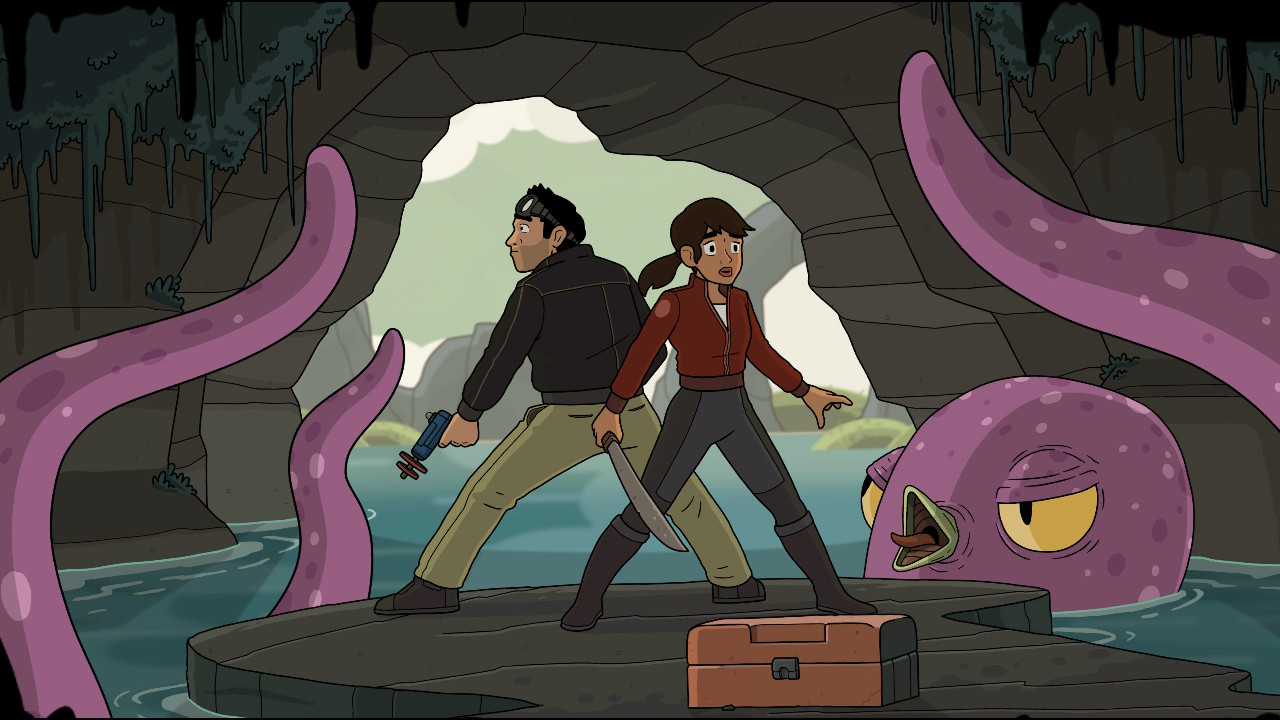A short, simple, story driven point and click adventure, Dexter Stardust is launching on to Nintendo Switch. The Finger Guns Review.
It’s the near future and a robotic army built by an alien race has invaded Earth. The invasion results in the desolation of our planet, wiping out almost everyone on the surface and turning it into a radioactive wasteland. No, it’s not the plot synopsis on the latest sci-fi series to hit Netflix. It’s the set up to Dexter Stardust, a point and click adventure game from Flynn’s Arcade and developers Dexter Team, headed by Jeremy Fryc. While the primer might sound dark and gloomy, this game is anything but. A bright and breezy comedic experience, Dexter Stardust attempts to emulate the classics from the genre while being accessible. Can it succeed? Well, almost…
In Dexter Stardust, you take control of the titular Dexter. Having escaped the destruction of Earth when he was younger, the adult Dexter now lives on Mars with his Uncle Jedo. Alongside his best friend Aurora, he works as a delivery driver, shipping boxes of dashboard hula girls and other merchandise around the galaxy. When they’re not shirking their responsibilities to get Tacos and play video games, that is. Seriously, almost everyone in this game has an almost unhealthy obsession with Tacos.
When a sales pitch goes sideways on Ganymede (Or “Granny Mead” as Dexter continually mispronounces it as), the protagonist finds himself at the centre of a web of intrigue. There’s a series of threats looming, all of which are circling Dexter, and it all stems from a tale from his history that’s drip fed alongside the main narrative. The storyline of Dexter Stardust is undoubtedly its strongest asset. While some of the moment to moment narrative beats feel a little absurd at times, the mystery that’s slowly unveiled throughout the game is engrossing enough to keep you powering through to the final credits.
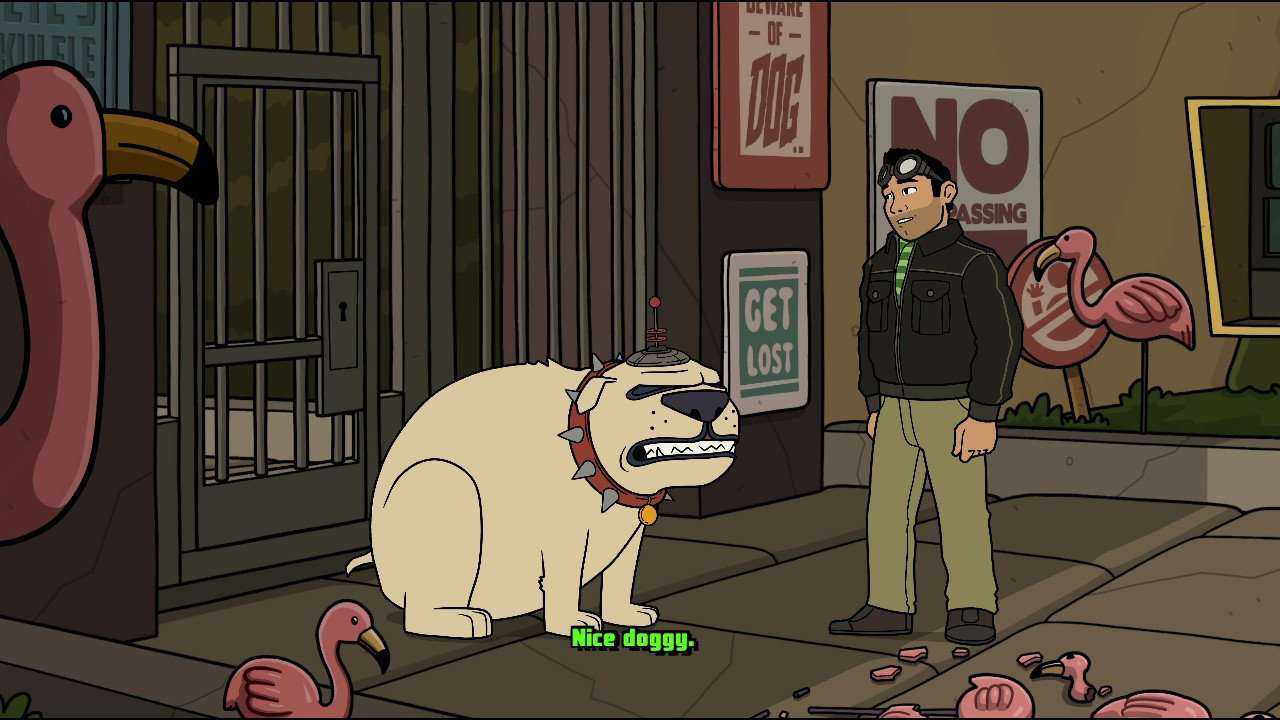
I say “final credits” because Dexter Stardust is broken down into 5 chapters (labelled from 0 to 4), each of which has a self-contained arc. Technically, you’ll see the credits 5 times when you play the whole 5-hour game. Each chapter begins with a short preamble that sets the scene before a title sequence plays that would feel at home at the start of a Saturday morning cartoon series. Then you’re off to the pointing, clicking and puzzle solving.
The first chapter is listed as “Chapter 0” because it’s more of an introduction to the characters and a tutorial for the controls than it is a fully fleshed out section. Seasoned adventure game fans will be instantly familiar with the set up. A cursor can be navigated around the screen and a click on ‘A’ will move Dexter where the cursor is pointed. Hover over interactive objects and the cursor will change to a plus symbol. Each arm of this represents an action and a button press on the Nintendo Switch. You can ‘Pick up’, ‘Talk Too’, ‘Use’ or ‘Look At’ each object. A staple for the genre, Dexter will talk to himself (and thus the player) to give context to these actions. Instruct him to pick up something fixed to the environment and he’ll say “That’s fixed down pretty well”, for example. Picking up objects adds them to an inventory where items can be combined or called for use by closing the inventory and then dragging them to the appropriate place. In almost every regard, Dexter Stardust follows the genre staples.
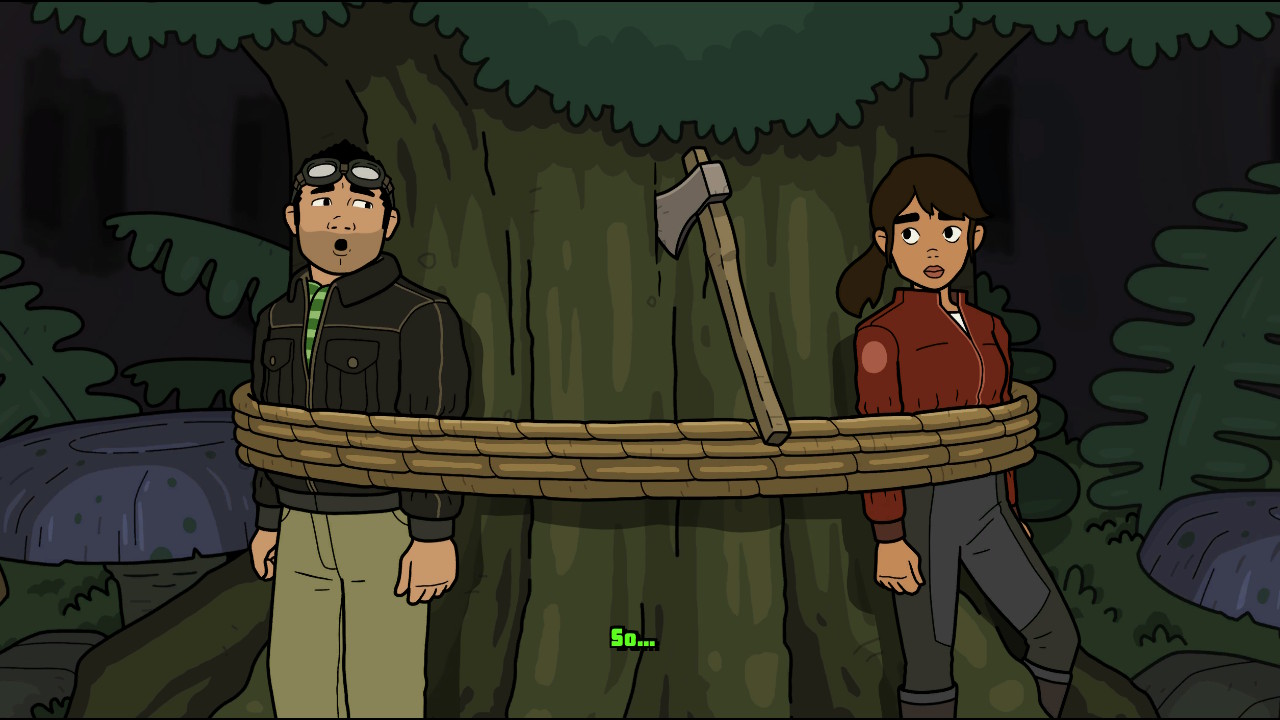
Where Dexter Stardust does feel like it differentiates itself from the herd is in its complexity. This game feels quite simplistic compared to your average adventure game. It actively goes out of its way to tell you the solution to most of the head scratchers it puts in front of you, even. For example, In the game’s first real chapter, Dexter finds himself locked up in a prison. At this time you’re only given 3 screen-sized areas to explore and there’s only really one logical path out of the situation – only its blocked by metal bars. In another screen, you see an alien hot sauce regularly being thrown out of a door. Dexter then exclaims that the sauce is widely known for melting metal. A little animation to show the hot sauce sizzling some metal might have made the puzzle far more thought provoking. Instead, it felt like just doing what you’re told to do.
This is a trend throughout Dexter Stardust. Objects of interest are highlighted in conversations, even when you’ve yet to find any context to them. Dexter will go out of his way to vocalise where particular objects could be used instead of letting the player figure it out too.
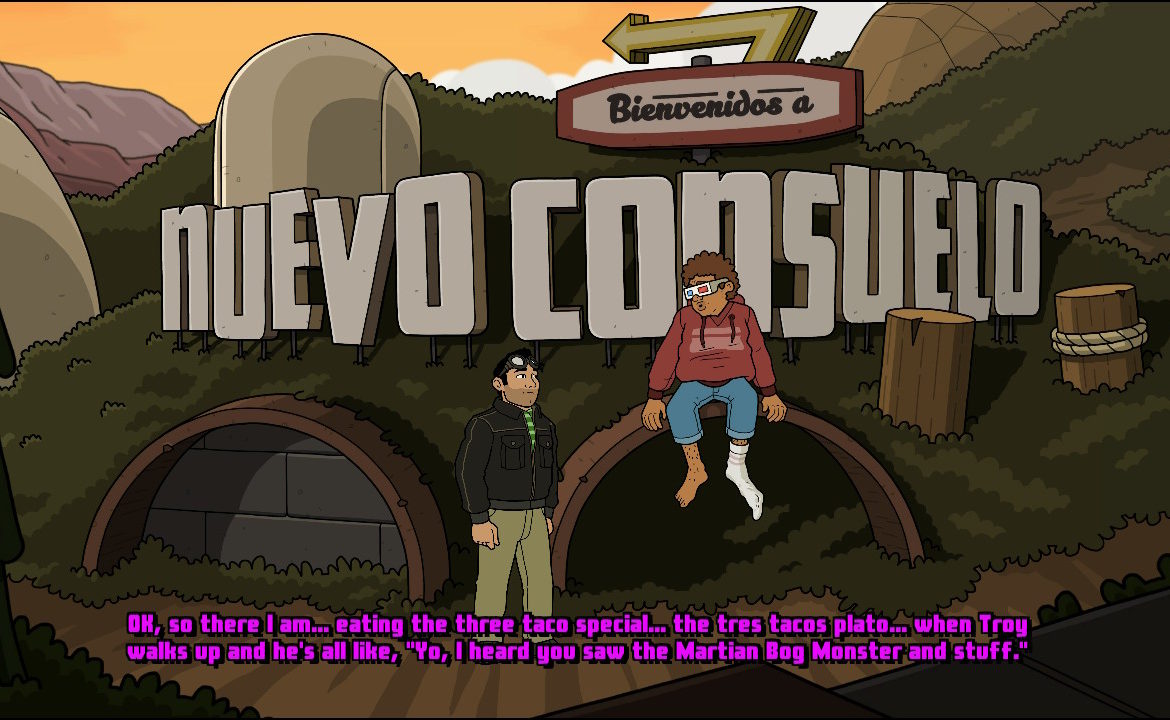
The relative simplicity isn’t necessarily a ‘bad’ thing. Dexter Stardust is undoubtedly the most approachable point and click adventure I’ve played in quite some time. I can certainly see this game being the first point and click adventure that some 7-10 year olds pick up and play through to completion without having to consult a guide/parent/guardian. For seasoned adventure gamers and those who like to ponder their puzzles – those who survived the Goat puzzle, for sure – will likely find Dexter Stardust to be too easy.
The most difficult Dexter Stardust gets is during Chapter 3 (or, the 4th Chapter) when the game opens up with quite a lot of areas to explore. There’s some longer puzzles here, some dependent on other things being completed first. So long as you’re picking up everything you can, even if there’s no clear purpose for it at the time, and talking to everyone you meet, even this chapter is straightforward enough that it won’t cause any problems.
It’s a shame that this longer, more challenging chapter is where Dexter Stardust struggles the most technically. It feels like this part of the game is designed to be played in a particular way and if you stray from that golden path, some aspects start to fall apart. For example: Talking to one character, I was given a dialogue option regarding how sorry Dexter is to hear about their break-up from another character. This was available before I’d even heard about the split. In another section, a looping series of rooms has a broken input where it’s impossible to pass through the door no matter how many times you click on it. Thankfully the rooms loop around so it doesn’t break the game – but it is an inconvenience. There’s nothing game breaking here, but it does start to feel a little rough around the edges.
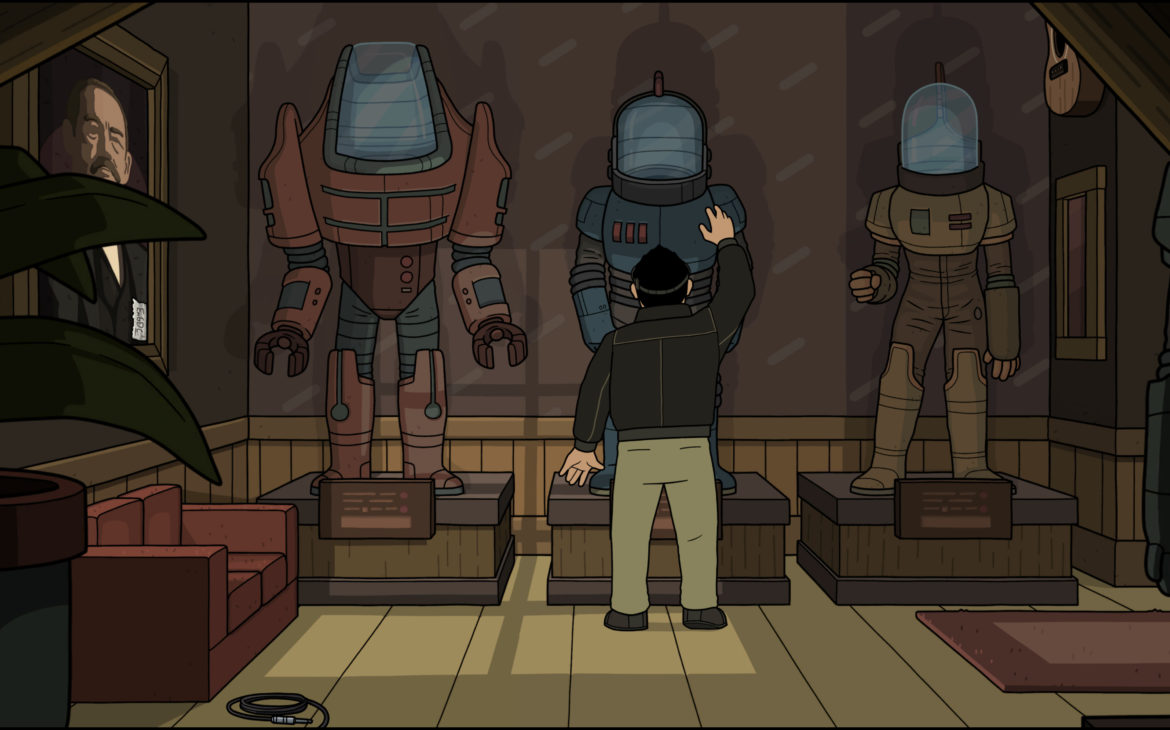
Despite its foibles, and in some ways because of them, Dexter Stardust manages to strike a fun, light hearted, speedily paced feel to it. There’s moments where the game has great self-awareness and shatters the fourth wall, such as when Dexter finds an item which will be utilised later. Dexter will state “Maybe I’ll find a use for this in a later episode?”. There’s more than a few pop culture nods and references to adventure classics like Monkey Island. The banter between characters, and Dexter’s apparent magnetism to calamity, is quite funny at times, enough to put the occasional wry smile on my face.
More than anything though, it’s the heart and passion that this game is obviously built on that eventually won me over. Sure, it’s easy – but it’s intentionally so to give younger players a chance. Sure, the voice acting is a little rough – but it’s delivered with such sincerity that it comes across as charming. Sure, the chapter pacing is all over the place – but the game is short enough to be played in just one of two sittings anyway. As you’re playing this game, you can feel the care that the developer has for this character and his world, especially the Mexican flair it all has. It’s endearing – enough for me to recommend this game despite its simplicity.
While Dexter Stardust is not bringing anything new to the point and click adventure genre, it’s an endearing passion project full of Mexican flair and light hearted humour. It might be a too short and easy for some genre aficionados, and it has a few foibles, but for most it’ll be a pleasant way to while away an evening with a cast of Taco obsessed space traveling characters.

Dexter Stardust is launching on Nintendo Switch (review version) and PC via Steam on March 3rd, 2022.
Developer: Piranha Bites
Publisher: THQ Nordic
Disclaimer: In order to complete this review, we were provided with a promotional copy of the game. For our full review policy, please go here.
If you enjoyed this article or any more of our content, please consider our Patreon.
Make sure to follow Finger Guns on our social channels –Twitter, Facebook, Twitch, Spotify or Apple Podcasts – to keep up to date on our news, reviews and features.
